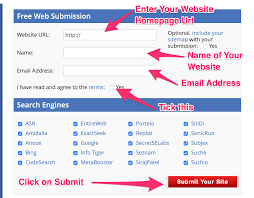Submitting Your Site to Search Engines: A Comprehensive Guide
Having a website is just the first step towards establishing your online presence. To ensure that your website is visible to potential visitors, it’s crucial to submit your site to search engines. This process helps search engines discover and index your website, making it easier for users to find you online.
Step 1: Create a Sitemap
Before submitting your site, create a sitemap that lists all the pages on your website. This XML file provides search engines with a roadmap of your site’s structure, helping them crawl and index your content more efficiently.
Step 2: Register with Google Search Console
Google Search Console is a free tool provided by Google that allows you to monitor and maintain your site’s presence in Google Search results. By registering your site with Google Search Console, you can submit your sitemap and track how Google indexes and ranks your pages.
Step 3: Submit Your Site to Bing Webmaster Tools
In addition to Google Search Console, consider submitting your site to Bing Webmaster Tools. Bing is another popular search engine, and by registering with Bing Webmaster Tools, you can ensure that your site is also indexed on Bing’s search results.
Step 4: Utilize Other Search Engine Submission Services
In addition to Google and Bing, there are other search engines like Yahoo! and DuckDuckGo where you can submit your site for indexing. Explore different search engine submission services to maximize the visibility of your website across various platforms.
Step 5: Monitor Your Site’s Performance
After submitting your site to search engines, monitor its performance using analytics tools. Track key metrics such as organic traffic, keyword rankings, and bounce rates to assess the impact of search engine submissions on your website’s visibility.
By following these steps and regularly updating your site with fresh content, you can enhance its visibility in search engine results pages. Remember that search engine optimization is an ongoing process, so continue refining your strategies to improve your site’s ranking and attract more organic traffic.
Essential FAQs on Submitting Your Site to Search Engines
- 1. How do I submit my site to search engines?
- 2. Is it necessary to submit my site to multiple search engines?
- 3. What is the importance of creating a sitemap before submitting my site?
- 4. Can I track the indexing progress of my site after submission?
- 5. Are there any fees involved in submitting my site to search engines?
- 6. How long does it take for a newly submitted site to appear in search engine results?
1. How do I submit my site to search engines?
To submit your site to search engines, you can start by creating a sitemap that outlines the structure of your website. Next, register your site with tools like Google Search Console and Bing Webmaster Tools to provide search engines with essential information about your site. By submitting your sitemap through these platforms, you can ensure that search engines crawl and index your content effectively. Additionally, consider exploring other search engine submission services to broaden the reach of your website across different search engines. Regularly monitoring your site’s performance post-submission is crucial to track its visibility and make necessary adjustments for improved search engine rankings.
2. Is it necessary to submit my site to multiple search engines?
When considering whether to submit your site to multiple search engines, it’s important to understand that while it is not necessary, doing so can potentially increase your website’s visibility across various platforms. While major search engines like Google and Bing are widely used, submitting your site to other search engines can help reach a broader audience and diversify your online presence. However, focusing on creating high-quality content and implementing effective SEO strategies is equally crucial in improving your site’s visibility, regardless of the number of search engines you submit to. Ultimately, the decision to submit your site to multiple search engines depends on your specific goals and target audience.
3. What is the importance of creating a sitemap before submitting my site?
Creating a sitemap before submitting your site to search engines is crucial for ensuring efficient indexing and crawling of your website’s content. A sitemap serves as a blueprint that outlines the structure of your site, listing all the pages and their relationships. By providing search engines with a clear map of your website, you help them navigate and index your content more effectively. This not only enhances the visibility of your site in search results but also ensures that all your important pages are discovered and ranked appropriately. In essence, a sitemap acts as a guide that streamlines the process of search engine bots exploring and understanding the relevance of each page on your website, ultimately improving its overall performance in search engine rankings.
4. Can I track the indexing progress of my site after submission?
Tracking the indexing progress of your site after submission to search engines is essential for monitoring the visibility and performance of your website. Utilising tools like Google Search Console and Bing Webmaster Tools allows you to track how search engines are indexing your site, identify any indexing issues, and measure the impact of your submission efforts. By regularly monitoring the indexing progress, you can gain valuable insights into how well your site is being crawled and indexed, enabling you to make informed decisions to improve its search engine visibility.
5. Are there any fees involved in submitting my site to search engines?
When it comes to submitting your site to search engines, the good news is that most major search engines offer free submission services. Google, Bing, Yahoo!, and other popular search engines typically do not charge any fees for submitting your site for indexing. However, some advanced features or tools within these search engine platforms may come with a cost. It’s important to be cautious of third-party services claiming to expedite the submission process for a fee, as they may not provide any additional benefits compared to the free submission options offered directly by the search engines themselves.
6. How long does it take for a newly submitted site to appear in search engine results?
When submitting a newly created site to search engines, one common question that arises is regarding the timeframe for the site to appear in search engine results. The indexing process can vary depending on several factors, such as the search engine’s crawling schedule, the competitiveness of your industry, and the quality of your website’s content and structure. In general, it may take anywhere from a few days to a few weeks for a newly submitted site to start appearing in search engine results. Patience is key during this period as search engines work to crawl and index your website before displaying it in their search results.




